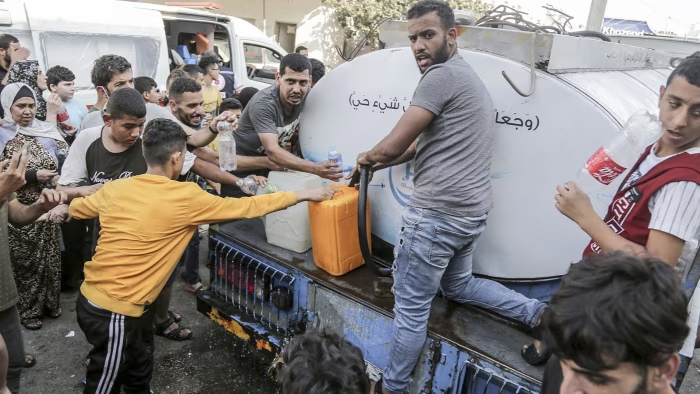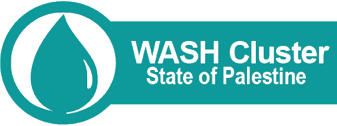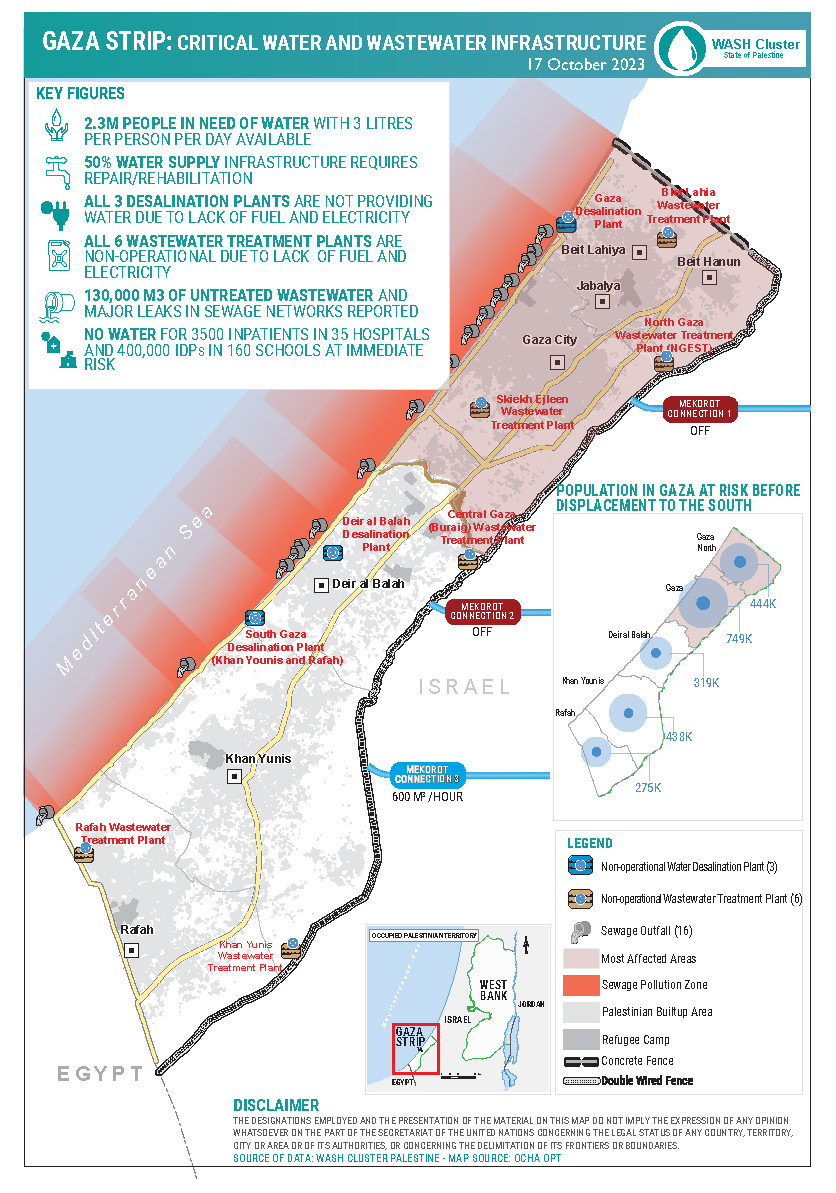URGENT PUBLIC STATEMENT FROM THE WASH CLUSTER
The hostilities that started on 7 October have triggered unprecedented needs and constraints on humanitarian access. The strip, which for the past 16 years has been under a strict closure, is now completely under siege with no movement, electricity, fuel, food or water allowed. Action must be taken to ensure that civilians are protected, and that safe, timely humanitarian access is granted.
The 2.3 million people living in the Gaza Strip urgently need water. The WASH Cluster estimates that only 3 litres/person is currently available, and this is likely to reduce further as fuel supplies are depleted. Reports are arriving hourly from the 102 official and other unofficial IDP shelters that the water reserves are finished. This statement is to alert the international community that the population of the Gaza Strip is at imminent risk of death or infectious disease outbreak if water and fuel are not immediately allowed to enter the Strip.
Most of the population is resorting to non-potable water sources for drinking, including agricultural wells of saline-brackish water. Consumption of non-potable water for drinking and cooking increases the risk of water borne diseases, including a potential surge of highly infectious diseases, such as cholera, that puts all populations living in inadequate environmental conditions in the region at risk. Use of agricultural water sources increases exposure to pesticides and other chemicals that will impact on the health of unborn, newborn, children, women and all people living in Gaza.
Households and shelters report rationing water supplies for drinking and cooking and are forced to neglect personal hygiene and sanitation needs. Limiting water for personal hygiene increases the risks of water-washed disease, a situation compounded by the heavily overcrowded living conditions. The lack of water for sanitation and hygiene will lead to health complications and outbreaks of preventable disease such as scabies and lice.
Children under five are at particular risk to this water shortage and the risk of diarrheal diseases, which are globally the leading cause of child mortality for under five year olds. Women and Children lack access to basic hygiene and sanitary items.
Sewage and solid waste are accumulating in the streets after the damage of carrier sewage lines and damages to the streets. There are also huge challenges of solid waste and wastewater management inside overcrowded shelters, with limited water and infrastructure.
The Gaza Strip is currently in a blackout, with no fuel, no electricity. The main sewage pumping stations and four out of five wastewater treatment plants have stopped working due to the lack of fuel. This is resulting in more than 130,000 m3 of water each day being discharged into the Mediterranean Sea, which is an environmental hazard.
Hospitals in the Gaza Strip are facing a water and sanitation crisis. Limited water supply is putting the lives of over 3,500 inpatients in 35 hospitals across the Gaza Strip at immediate risk. Water is needed to ensure sanitary conditions on inpatient wards, in operation rooms, and emergency departments. It is essential for the prevention of hospital associated infections and for the prevention of outbreaks in hospitals. Hospitals are beyond capacity and overstretched. Meanwhile, stocks of sterilized saline are facing critical shortages, needed for cleaning the wounds of those injured and for maintaining the lives of patients who are catheterized, undergoing surgery or in intensive care.
Water production and Supply in Gaza
The Coastal Municipal Water Utilities provide 80% of Gaza water supply from a range of municipal groundwater sources. The majority of water systems are heavily impacted and/or non-operational due to lack of fuel, insecurity in locations of operation and damage to production, treatment and distribution infrastructure. According to the Palestinian Water Authority (PWA), water production capacity is at 5% of the normal daily production, and reducing by the hour.
The Mekorot water supply from Israel provides 13% of the Gaza water supply needs, approximately 53,000 m3 per day. The pipeline has provided no water between 9 and 15 October with no prior coordination, however early reports indicate the pipeline is now supplying some parts of South Gaza.
Three desalination plants capable of producing 7% of Gaza’s water supply are currently not operational. These Short Term Low Volume Desalination plants have a production capacity between 18,000-32,000 m3/day but require electricity or fuel. The power supply in or to Gaza is currently not operational and the desalination plants are providing no water.
The limited bottled water availability on the markets is nearly depleted. The cost to purchase bottled water has increased dramatically and is now beyond the reach of an average Gaza family budget. Access to markets and vendors is restricted due to the insecurity and ongoing bombardment. Water trucking operations are not operating due to the lack of fuel, insecurity and roads blocked by debris.
WASH Partners Preparedness
The WASH Cluster and partners are for the moment still not able to fully assess the damaged WASH infrastructure in the Gaza Strip due to the ongoing bombardments. Initial estimates are that more than 50 per cent of the water and sewage networks in Gaza City and northern Gaza region will require significant reconstruction and rehabilitation. However, it is predicted that the damages are in fact much higher.
WASH actors are on the ground in the Gaza Strip and ready to conduct immediate technical damage assessments on the water supply and sewage infrastructure as soon as there is a ceasefire in place. WASH agencies are on standby for distributions of hygiene kits, bottled water and to re-start water trucking operations. Agencies have begun prepositioning critical WASH items in strategic supply hubs as soon as access to Gaza is granted.
The WASH Cluster urgently appeals for:
- An immediate ceasefire to allow for the safe movement of people and goods inside the Gaza Strip.
- The immediate establishment of a humanitarian corridor into Gaza and the immediate entry of water and fuel.
- The immediate distribution of fuel to key water production and treatment and sewage treatment facilities.
- Full and uninterrupted restoration of the Merokot water supply line from Israel into Gaza.
Cover Photo Take by: @Haitham Imad/EPA/Shutterstock
https://www.ft.com/content/79fb29e1-3867-4f6d-853d-dffa02f38c81



